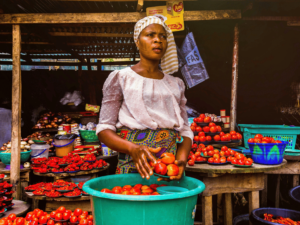Introduction
As of 2019, approximately 60% of employed women within Sub-Saharan Africa worked in agriculture, a field gravely impacted by corporations’ exhaustive use of natural resources. The financialisation and depletion of natural resources within these African communities lead many women to experience poverty and destitute living conditions. Approximately 62.8% of women worldwide who live in extreme poverty reside in Sub-Saharan Africa. Additionally, the reality of worsening environmental conditions exacerbates the deterioration of women’s quality of life. According to the UN Women’s Organisation, African women often overly endure labour exploitation within capitalist markets, leading to environmental degradation and unsustainable development practices to persist among financially driven corporations. Similarly, a brief submitted to the 2015 Global Sustainable Development Report (GSDR) emphasises the impracticality of achieving sustainable development within African communities if the alienation of half of the population (women and girls) persists socially, economically and politically. Ultimately, sustainable development within African communities cannot be achieved without gender parity.
Thus, such a significant nexus between gender equality and sustainable development makes gender egalitarianism imperative within Africa to sustainably develop its communities. This article critically examines the intimate and delicate relationship between the realisation of sustainable development and women’s involvement in policy and decision-making and highlights pathways to successfully achieve sustainable development and gender egalitarianism within African communities.
Frameworks for Evaluation
Legal Norms
Several legal norms underline the value of women’s participation in sustainability initiatives.
Firstly, The United Nations’ (UN) Paris Agreement (PA), is the globally renowned international treaty focused on amending the climate change challenge. It aims to maintain the increase in the global average temperature below two degrees Celsius and ultimately drive it down to one and a half degrees. The PA also emphasises the need for gender equality and egalitarian involvement to reach its goals, articles seven and 11 highlight the necessity for a gender-responsive approach to climate change mitigation, noting that both men and women play crucial roles in addressing the climate crisis and preventing the degradation of land, vegetation and natural resources.
The UN’s Convention on the Elimination of All Forms of Discrimination against Women (CEDAW), is a prominent international instrument designed to combat gender discrimination and promote the rights of women. Articles one and two address women’s critical role within political, economic, social, cultural, and civil positions besides their male counterparts. Likewise, The Beijing Declaration and Platform for Action (BPfA), established in 1995, is a leading international blueprint for women’s empowerment and involvement within economic, political and policy areas. BPfA identifies 12 areas in which urgent action is needed to establish gender egalitarianism, i.e. women’s increased involvement in policy, the economy, and education to better aid in sustainability efforts regarding the development of communities and economic systems.
Regionally, the African Charter on Human and Peoples’ Rights on the Rights of Women in Africa (Maputo Protocol) is the leading framework on women’s human rights. It strives to expand the rights of women and girls through measures such as increasing women’s involvement in national political systems, and social and political egalitarianism with their male counterparts. Articles 15-19 of the protocol underscores women’s critical role in the development of African communities and their right to reside in a sustainable environment. Although several other policies discussing women’s necessary involvement have been passed in local, regional, and international scales, this article will focus on the frameworks selected above to address the intersection between sustainable development and gender equality within the continent of Africa.
Conceptual Frameworks:
According to the UN, Sustainable development is broadly defined as “development that meets the needs of the present without compromising the ability of future generations to meet their own needs”. For this paper, we are going to focus on agricultural sustainability and leverage the definition set forth by the Food and Agriculture Organisation of the United Nations (FAO) which defines sustainable development as “the management and conservation of natural resources, while also ensuring that human needs are met.”
Gender Equality and Sustainable Development: Understanding the Challenges
Women and Domestic Politics
Women are often disproportionately underrepresented in decision-making and policy crafting within African communities due to societal expectations that often bind them to the cult of domesticity. A 2014 World Survey on the role of women in development emphasises the projected continuation and exasperation of gender inequality and (un)sustainable development of African communities if underrepresentation continues. Women and girls, who are often most affected by environmental and agricultural degradation, often possess tremendous knowledge regarding sustainability practices for their communities and resources. Their lack of involvement within policy, however, leads to sustainability challenges being insufficiently addressed as those affected most (women) are left out of the decision-making process. Despite being clear sustainability actors, women occupy just one-third of decision-making positions under the United Nations Framework Convention on Climate Change and other protocols such as the Paris Agreement on climate change, and women only make up 15% of environment ministers. Likewise, as of 2021, the average proportion of women in single or lower houses of national parliaments within African states was 25.2%, compared to 74.8% of their male counterparts.
Women’s Alienation in the Law
Although the UN and other international entities deem it important to address the gendered differences of sustainable development in policy and legislation, women are seldom addressed in both the global and regional norms. The UN and the Nkafu Policy Institute report that laws within African countries have often conventionally excluded women and girls from their formulation and implementation. Thus, one can conclude that women’s sustained alienation from the creation of policy will continue to exacerbate the inequality faced by the genders, creating greater burdens for women and further steering away from sustainable development.
With women accounting for up to 52% of Sub-Saharan Africa’s agricultural sector, their alienation in decision-making not only greatly impacts gender equality within the continent, but its food systems as well. Despite women’s extensive involvement in Africa’s agribusiness, their political exclusion prevents them from equal participation such as owning land, expanding agricultural processes, and advancing the socio-economic status independently and community -wide. Women’s absence from decision-making also makes them more susceptible to destitute living conditions and food deprivation due to their lack of advocacy and representation against unsustainable development.
Despite gender equality being the fifth critical Sustainable Development Goal (SDG) set forth by the UN, little has been done by African and international states to enforce policies that work towards eliminating discrimination and promoting women’s empowerment.
Gender Equality and Sustainable Development: Successful Implementation
As of 2021, over 45% of the Norwegian parliament has been comprised of women, ranking 13th in overall female representation within policy worldwide. Norway, alongside other Nordic countries, considers a gendered framework by recognising the link between climate security and gender in their updated National Action Plans on Women, Peace, and Security. The nation’s strong stance on climate change can be seen through its policies, such as Reducing Deforestation Emissions and Forest Degradation, clean energy initiatives, and the Clean Development Mechanism – a United Nations-run program that helps developing countries undergo greenhouse gas emissions-reducing projects. Although not solely attributed to its female representation in policy, Norway’s gender integrated legislation and executive enforcement of climate change policy have effectively ranked the country first in renewable (sustainable) energy. Although Norway’s terrain, demography and cultural norms differ from that of African countries, the nation’s climate change initiative, as well as its simultaneous achievement of sustainable development and gender equality practices can be leveraged as inspiration for similar Afro-centric practices.
A notable case study in which gender equality initiatives succeed is depicted in Rwanda’s 2023 gender quota policy. It mandates that at least 30% of Rwanda’s parliamentary seats be reserved for women, contributing to a significant rise in women’s political representation – with women holding approximately 61% of seats in the lower house as of 2021. The attentive implementation and enforcement of the gender quota policy has empowered women to actively participate in decision-making and has resulted in the implementation of gender-sensitive policies addressing various social and sustainability issues. For instance, Rwanda’s Gender Equality in Economic Transformation Plan intends to increase the land ownership of women within the agriculture industry, further working to contribute to sustainability and increase women’s access to financial credit.
Forging an Inclusive and Sustainable Path Forward
A Gendered Approach:
As defined by the UN, a gendered pathways approach is a framework that addresses the tensions, intersections, and trade-offs between gender equality and sustainability. It is imperative that different perspectives be taken into consideration and various nexus be acknowledged when developing sustainability pathways that ensure human well-being, ecological integrity, gender equality, and social justice. Pan-African strategies for environmental preservation have contended that more effective strategies and policies can be enacted for agricultural and environmental preservation when women are included in decision-making.
The implementation of Nationally Determined Contributions (NDCs) and other strategies for reducing and adapting to climate change in Africa could also demonstrate measurable progress towards promoting gender equality and projecting the continent to a more sustainable future. By gaining insight from feminist political economies and ecologies, African countries can employ a gendered approach in how they navigate, tackle and ultimately achieve sustainability.
Using International Legislation
National climate change policies (NCCPs) under the Paris Agreement, which consist of regulations and strategies enacted by individual countries to address the impacts of climate change, must prioritise gender equality. Countries within the African continent that have signed and ratified the Paris Agreement must uphold international legislation and work towards achieving a sustainable environment while aiming for an egalitarian society. Furthermore, legal representatives and judiciaries must use the latitude granted to them by this international law to hold member states accountable to the terms of sustainability set forth by such international agreements.
Agenda 2063
Agenda 2063(Agenda) is an African Union policy framework aimed at realising more inclusive, sustainable development in African communities. According to aspirations one and six of the Agenda, the intersection between environmental sustainability, climate resilience and gender equality are heavily highlighted and consequential to a better Africa. Therefore, it is imperative that nations throughout the African continent are held accountable by stakeholders and legislative governing bodies to fulfil the initiatives set forth by the agenda. In order to ensure that women are appropriately addressed with regards to sustainability impacts in agriculture, African nations must hold each other accountable and prioritise these sustainability efforts despite competing areas of need.





